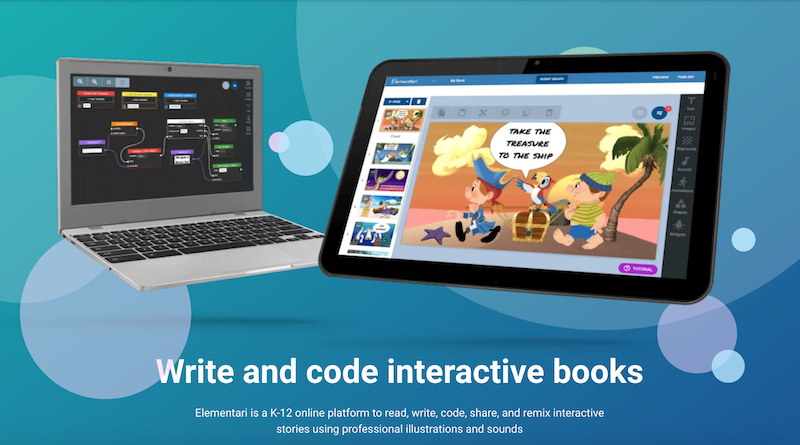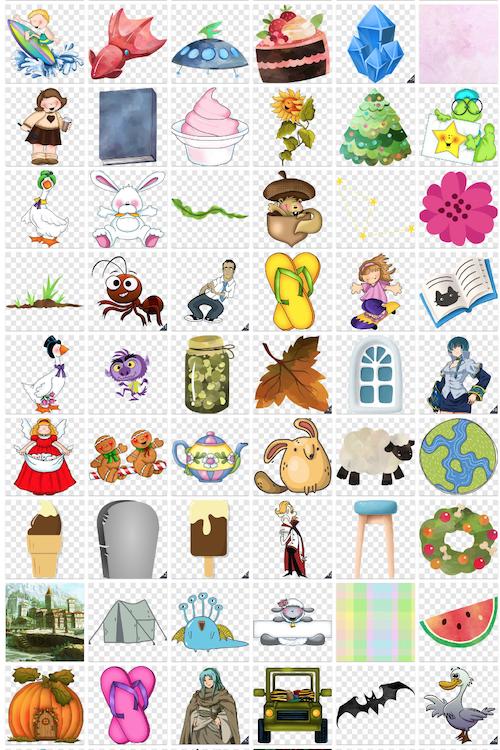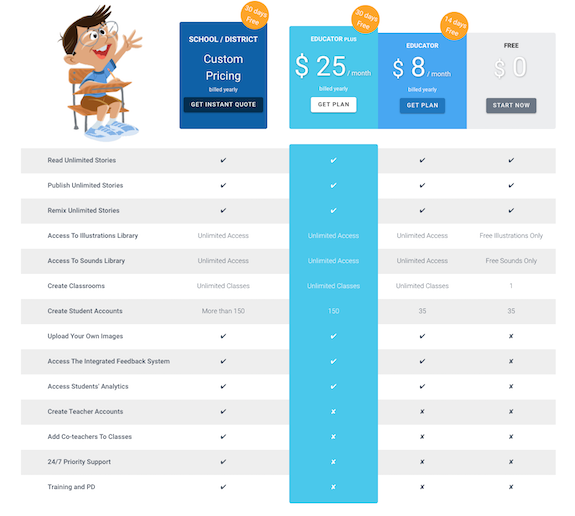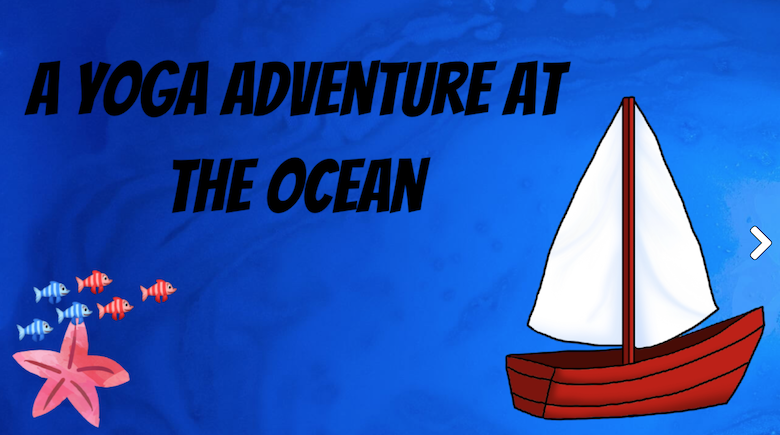In March of 2019 we were fortunate enough to interview Nicole Kang, one of the founders of Elementari for our Sustainable Funding Series for Media, Educators, Technologists, and Creators. Elementari is a platform for creating interactive stories, targeted to schools, teachers, and kids. Below, we share that interview, insights into the Sustainable Funding Model that Elementari is building towards, as well as other conversations that Nicole and I had around diversity and inclusion in storytelling, open education, marketing, and Elementari itself. This was just the beginning of a journey that myself and our team at StoryToGo are taking with Elementari and Nicole Kang, as we have begun to use Elementari ourselves, creating our own interactive stories, and have taught kids and adults alike how to bring their stories to life with Elementari.
Elementari has a huge component that is based around computational thinking and trying to introduce coding concepts in a way that is not code to students who might not want to learn how to code.
~ Nicole Kang, Cofounder of Elementari
Creators: Nicole Kang & David Li
Country: France
Interview Date: March 24th, 2019
Link to the Project: https://www.elementari.io/
Funding Method: Blood-Sweat-&-Tears, Freemium Model, Workshops & Speaking Engagements
Interview with Elementari’s Nicole Kang
The Project : What Is Elementari?
Elementari is an online platform for building interactive stories, designed based on a culture of remixing. Users are able to add their own imagery and sound, but the platform is ultimately designed to remix the professional illustrations and sounds of artists. These artists are automatically credited when an Elementari user publishes a story using the artist’s work.
While Elementari can be used by adults, and holds a lot of potential for creators such as ourselves, the platform was ultimately designed for Kindergarten to Grade 12 schools, teachers, and youth, as a tool to facilitate reading, writing, coding, game design, and building an understanding of crediting artists and of remix culture. In the interview teaser below (starting at time marker 01:59), Nicole talks about her sensibilities behind Elementari …
The Creators : Who Are Behind Elementari?
Elementari was co-founded by Nicole Kang and David Li.
Nicole Kang is a bit of a world traveller, born in the US and now living in France. She studied Management Science at MIT, but most of her work experience has been in education, particularly around scientific inquiry and STEM. Included in this was working in the Educational Arcade at MIT. Nicole’s interest education took her to Taiwan to pursue a Masters, where she ran into issues in conducting experiments in scientific inquiry, as she doesn’t write in Chinese. This created a shift to ESL and ultimately to developing the concept for Elementari, sparked on by a course in digital ebooks. Nicole recognized the need for Elementari in the course as they were using InDesign which at that time she found unnecessarily complicated, frustrating, and impossible to share. All things that Nicole believes are counterintuitive to what education should. Rather she believes education should be open to everyone, allowing everyone to be able to learn, catalyzing her to leave her Masters to begin to build Elementari. In building Elementari, Nicole primarily focuses on the packaging, the marketing and the backend website development.
Meanwhile, David Li has focused on building the authoring tool. David’s background before starting Elementari with Nicole was in engineering, management, and linguistics.
I believe education should be open to everyone, allowing everyone to be able to learn.
~ Nicole Kang, Cofounder of Elementari
Road to Funding Sustainably
Early Days, Solving the Initial Challenges
Two of Nicole and David’s early realizations in developing Elementari and a sustainable funding model behind it were:
- that they needed to have something built to show, in order to attract funding to the project; and
- that they needed assets in the forms of illustrations and sounds for Elementari users to build their stories with.
After some initial unsuccessful pitching of Elementari in Taiwan and France, Nicole and David realized from comments like, “What’s the point of creating stories? Who reads stories? Who wants to write stories?” and “If you only need $100,000, then since you went to MIT, why don’t you just ask your friends and family to pitch in and pay for it?”, that they were going to need to build and demonstrate what Elementari was capable of, before continuing to invest their time in marketing the platforms to potential funders. Despite never having undertaken a digital development prior to Elementari, David and Nicole were determined that they could solve the first problem by teaching themselves and building Elementari on their own to present to potential investors. Impressively, they have done just that.
Not being artists, the need for assets needed a different approach to solve. For this, they recognized that many illustrators were sharing their assets on social media for likes, but that was the limit to the engagement they were creating around their illustrations. So they decided to invite artists to share their images on Elementari for users to build stories with. This enabled the artist to build upon their portfolio for marketing purposes, by giving them stats as to how Elementari’s user base are utilizing their images, and which images are the most popular. This has worked for them, attracting in artists like Len Smith, who illustrated Toontown in Who Framed Roger Rabbit, and Richard Walsh, who illustrated the Math Blaster Reading Series. Surprisingly Elementari’s team discovered that it wasn’t the young art students who were interesting in contributing images, but rather the older professional artists. They think this is because the professional artists like the idea of kids being able to use their artwork to create stories, they enjoy this different avenue to promote themselves, and as they see the future potential in profit sharing with the platform.
Funding Structure for Elementari Users
Currently Elementari is free for everyone to use to create stories with a limited library of images and sounds. A paid Premium version of Elementari gives users access to the entire library of images and sounds.
Similarly there is a free teacher tier for educators that allows for one class of up to 35 students, and then Premium versions for more capabilities, unlimited classes, more students, and for schools and school districts. You can see an example of Elementari’s plans for January 2021 below.
It is the Premium Educational Plans that the Elementari team sees as their sustainable funding model for the future.
We don’t want to put a barrier in the way for anyone to create. We want the disadvantaged kids to still be able to make their dino stories into reality. That’s one of our main goals.
~ Nicole Kang, Elementari Co-Founder
All the educational support materials that are being built to teach lessons with Elementari are public, and teachers are encouraged to adapt and remix to suit their individual classroom needs. Those can be found by clicking here.
Other Funding Streams
Other ways that Nicole and David are helping to fund the early days of Elementari, include:
- writing workshops, and
- pitching the Premium Model.
As part of pitching the Premium Model, they have been taking on educational partners to run case studies and develop curriculum. During the case study and curriculum development, the partner gets free use of Elementari, and then after the case study and curriculum development, the partner has the option to sign up for Elementari at a reduced rate provided they wish to continue using Elementari.
Future Building
In the future, some of Elementari’s goals include:
- profit sharing with their artists (aiming for up to 70%),
- working with the schools to create examples of what a good classroom library would look like to help convince the school gatekeepers that Elementari is a good investment for their school,
- the option of non-remixable stories for sensitive content and for professional writers,
- ability for readers to choose their own characters for a story.
Ultimately, creating a bottom up, product creation approach to marketing is what Nicole believes will work for Elementari. Basically working with educators and kids to demonstrate what is possible, in order to get Principles, School Districts, and Parents to buy in. It is with that in mind that Elementari has approached the COVID-19 pandemic, giving teachers and parents access to a free classroom account on a trial basis, offering a free virtual coding club, hosting free webinars for educators, and offering virtual field trips for Hour of Code.
Other strategies that help to market Elementari are:
- that the stories are embeddable on other sites, and
- an Elementari Ambassador Program with percentage sharing on sales.
Final Thoughts on Being an EdTech Entrepreneur
Some final reflections and advice from Nicole on being an EdTech Entrepreneur …
Have a question for Nicole? Ask it in the comments below, and we shall see if we can get you an answer.
A enormous thank you to BCIT for sponsoring this case study, to Grant for the Web for funding the broader Sustainable Funding Series,to the AMTEC Trust Award and CNIE for funding my professional development work around this work, and to David Porter for acting as an advisor to me in this work.







